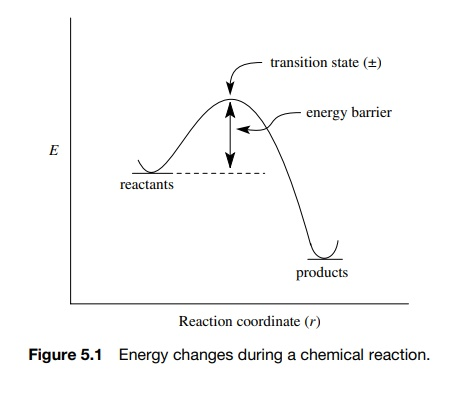I know this is not an original observation, but recent events have made me grok it in a way I had not really before. The principal function of an entrepreneur 1 is to act as an economic catalyst: organizing talent, money, and other resources to as to be able to lower and ultimately surmount the activation energy of moving to a new economic configuration and thus shake a local section of the economy out of its local minima.
In chemistry, we often have the following simplified model of reactions that look like this:

We have the reactants which are our starting chemicals, and we want to make the products of the reaction – i.e. we want the reaction to happen. In this case (an exothermic reaction), the products have a lower energy than the reactants and so nature ‘wants’ the reaction to happen – it will naturally produce/release energy and increase the entropy of the system. However, the reaction cannot immediately happen because there is an energy barrier that the system needs to surmount – while the products have less energy than the reactants, for the reaction to happen many of the existing bonds in the reactants have to be broken, and this requires energy which has to come from somewhere. Thermodynamically, the reaction will happen ‘spontaneously’ approximately to the negative exponential of the size of the energy barrier thus even moderately small barriers make the reaction vanishingly unlikely and hence occur slowly. In chemistry, however, there are also catalysts. These are other molecules which lower the activation energy of the reaction, even though they themselves are not directly involved in the reaction. Typically, this happens because the catalyst interacts with some of the reactants in a way that weakens the key bonds preventing the reaction from occuring.
Entrepreneurs are essentially the catalysts of economic reactions. We can think of the economy at any point in time as an energy landscape. The ‘energy’ here is some measure of economic efficiency or total possible wealth. There are many configurations of an economy, and some are richer, happier, and more efficient than others. There are a huge number of possible trades people might want to make but cannot for various reasons. Maybe the product they would want to buy does not exist, or they do not know that it does exist. Maybe the company they want to work for does not exist. Maybe they have a great idea but it takes capital to set up that they don’t have. Maybe if person X and person Y collaborated they would have a great idea and produce something awesome, but they don’t know each other. These are all energy barriers between the current state, and a potentially better economic state. The economic function of entrepreneurs is to reduce this energy barrier, create an environment where these transactions can take place, and ultimately shift the economy to a better local minima than its current state.
Usually, these energy barriers take a number of well-known forms such as:
Capital barriers: Person X has a great idea for something and could make a lot of money if they could produce it to sell, but they don’t have that money and need to borrow or get it from somebody else. Reducing these barriers is a large part of what the financial and VC industry does.
Coordination barriers: a number of people could come to a mutually beneficial trade if they could all agree on it and be sure that the other parties will agree, but they cannot coordinate to make sure that this is the case, so it doesn’t happen.
Networking barriers: Some number of people could figure something out or produce something valuable if they knew each other, but they do not and are vanishingly unlikely to all meet by chance.
Distribution barriers: Person A has a great product and person B really wants to buy the product but, for whatever reason, there is no way for person A to actually get the product to person B or alternatively for person B to get money back to person A.
The purpose of an entrepreneur is fundamentally to attack these barriers and lower them enough and provide enough activation energy that a self-sustaining exothermic reaction (i.e. a profitable startup) can be created that ultimately shifts the equilibrium condition of the economy to the new (and hopefully better) configuration. The early ‘job’ of an entrepreneur in a startup is thus almost always directly attacking these barriers – raising capital (capital and coordination), recruiting a team (networking/coordination), finding and selling to customers (distribution/coordination) and, ultimately having a vision for a new possible configuration of the economy to aim for.
-
By this I mean entrepreneurship and startups in the Paul Graham sense of a company that can grow big and is VC-fundable and not just anybody who starts a small business. ↩